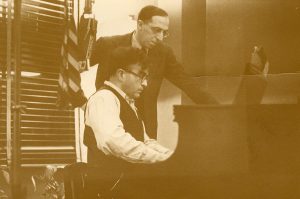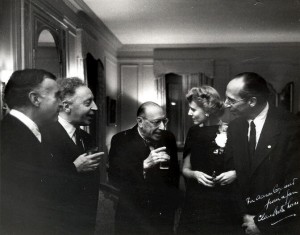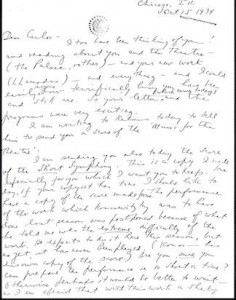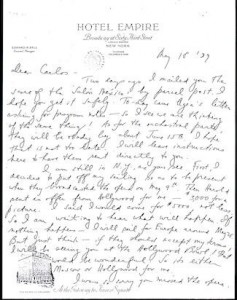Aaron Copland and Carlos Chávez met in New York in 1926, both young and only at the beginning of their long and influential careers.1 They became close friend, and although much of their relationship was long distance, they maintained a strong connection, “mentally and spiritually and musically.”2 The long lasting bond between the composers can be partially attested to their natural fondness for each other and additionally to the similarities between them.
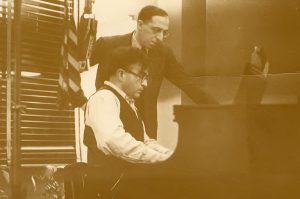
Aaron Copland and Carlos Chávez3
Born a year apart, they both began musical study on piano before pursuing composition and harmony lessons in their teens.4 Additionally, both studied in Europe in the 1920s, where they were exposed to the latest innovations in art music.5 Over the course of their careers, the two seemed to develop a similar approach to modern composition in relationship to national identity. They both found the use of folk music as an effective way to create a distinctive “New World” sound.6 Many of Copland’s most beloved works, such as El Salón México and Short Symphony quote or incorporate the sounds of Mexico that he encountered on his many trips to visit Chávez. Similarly, Chávez’s works were celebrated by Mexican musicians for establishing a modernist, Mexican sound with use of Mexican folk music.7
Copland admired Chávez’s non-European sound and “complete overthrow of nineteenth-century ideals.”9 Similarly, Chávez deemed Copland’s works as, “genuinely American,” and “the music of our time.”10 Their mutual respect for each other helped facilitate a cultural exchange of a new musical sound. Both Copland and Chávez introduced, programmed, and conducted the works of the other in their respective geographical locations.11 The quintessential American sound of the 20th century must be not only attributed to Aaron Copland, but Carlos Chávez and the close relationship between them.
1 POLLACK, HOWARD. “Aaron Copland, Carlos Chávez, and Silvestre Revueltas.” In Carlos Chavez and His World, edited by LEONORA SAAVEDRA, 99–110. Princeton University Press, 2015. http://www.jstor.org/stable/j.ctt1cg4n5s.11.
2 Copland, Aaron, Elizabeth B Crist, and Wayne Shirley. The Selected Correspondence of Aaron Copland. 1st ed. New Haven: Yale University Press, 2006.
3 Copland, Aaron. Aaron Copland and Carlos Chávez. , . [Date of production not identified] Photograph. https://www.loc.gov/item/2023781702/.
4 Parker, Robert L. “Copland and Chávez: Brothers-in-Arms.” American Music 5, no. 4 (1987): 433–44. https://doi.org/10.2307/3051451.
5 Ibid.
6 Murchison, Gayle. “‘Folk’ Music and the Popular Front: El Salón México.” In The American Stravinsky: The Style and Aesthetics of Copland’s New American Music, the Early Works, 1921-1938, 190–207. University of Michigan Press, 2012. http://www.jstor.org/stable/j.ctv3znzqf.15.
7 MIRANDA, RICARDO. “‘The Heartbeat of an Intense Life’: Mexican Music and Carlos Chávez’s Orquesta Sinfónica de México, 1928–1948.” In Carlos Chavez and His World, edited by LEONORA SAAVEDRA, 46–61. Princeton University Press, 2015. http://www.jstor.org/stable/j.ctt1cg4n5s.8.

